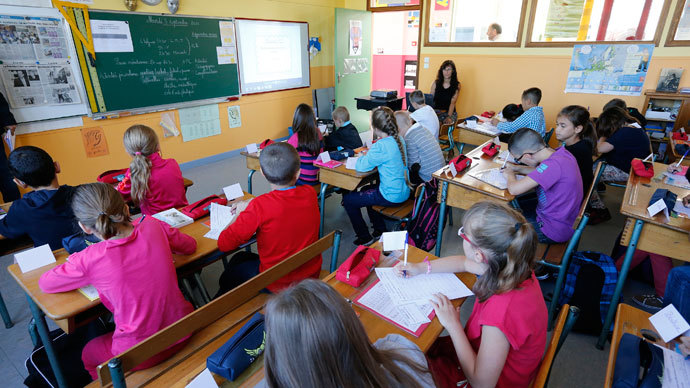French Muslim leaders pan ‘secularism charter’, warn of ‘stigma’ boost

Leaders of France's 6 million Muslims have been discouraged by the new ‘secularism charter’ designed to toughen rules banning religion from schools. Critics say it’s unsuitable for modern-day France, home to Europe’s largest Muslim population.
From now on, the ‘Charter for Secularity in School’, which starts
out by declaring that France "respects all faiths" and that the
state is neutral in regard to them, is to be displayed in every
state-funded school across the country in order to "be
seen" and respected.
The 15-point statement highlights key principals of secularism,
such as freedom of conscience and separation of religion and
state, in a bid to ease tensions between Muslims and
non-religious students.
The French Muslim community did not welcome the ‘secularism
charter’, which many of them viewed as part of a bigger campaign
promoting religious hatred, and an assault on Islamic values and
traditions.
The chairman of the French Muslim Council believes that the
charter is full of "allusions" to Islam, highly likely to
boost “stigma”.
"Ninety percent of Muslims are going to have the feeling they
are being targeted by this charter, while in 99 percent of cases
they cause no trouble to secularism," Dalil Boubakeur told
AFP. "Why go back to the 2004 law banning conspicuous
religious symbols in schools?" he wondered. "There’s also
a call for gender equality..."
Boubakeur is sure that the text will eventually prove to be
"counterproductive."
But according to the Socialist government's education minister,
Vincent Peillon, the charter is merely an attempt to “get
everyone together” to share common values and to promote
better understanding of the principles, which go back to
anti-clericalism of the French revolution, and the country's 1905
law enforcing a strict separation of church and state.

“Secularism is a fight not against some, but for all; for
those who gather together, and must bring everyone else
together,” Peillon stated on Monday.
"For example, there are people who believe that secularism is
mostly about banning things. Secularism is what allows us to
coexist freely together," explained the minister, who is also
planning to introduce a course of secular morality lessons in
2015.
Many Muslims fear that stricter laws at schools and universities
would only deepen the gap between religions, and step up acts of
racism and hatred against them.
In her response to the charter, President of the National Front
Marine Le Pen said she regrets that "no real measure has been
announced to fight effectively against the advances of
communalism."
"Secularism is no longer [something] to write about, it’s to
be done", because of "disturbing development of communalism and
political and religious demands," she added in a statement,
as quoted by Le Monde.
According to the charter, absence of religion from schools
actually gives students an opportunity to shape their personality
and exercise free will in an environment exempt from political
and religious pressure. It basically means that French teachers
cannot reveal their religious beliefs during lessons, nor are
pupils allowed to highlight their faiths.
In 2004, France passed a law banning schoolchildren from wearing
conspicuous religious symbols, such as Muslim headscarves or Sikh
turbans, but the law excluded universities. Now the High Council
of Integration (HCI) wants to see the same rules applied to
universities. In August, the research institute founded by the
French government recommended prohibiting students from wearing
religious symbols, such as Christian crucifixes, Jewish kippah
(yarmulke) skullcaps and Muslim headscarves.

Earlier this year, a 15-year-old Muslim girl was expelled from
school in France for wearing a headband and long skirt, a
combination deemed “too religious” by her college
disciplinary board. The girl’s family took the case to the
Administrative Court, which ruled the schoolgirl should be
reintegrated. France’s Council of State then reversed the court’s
decision, and the college expelled Sirine Ben Yahiaten for good.
Her parents are now suing the school for racial discrimination.
The controversial legislation has also outraged France's 30,000
Sikhs, whose males are required by religion to cover their hair
from an early age. In 2005, a French court supported a school's
decision to expel three Sikh boys, aged 15 to 18, for wearing
turbans - symbols of Sikh identity - to school, as they made them
"immediately recognizable as Sikhs." Since then, a number
of Sikh teenagers living in France have been pushed to give up
school.















